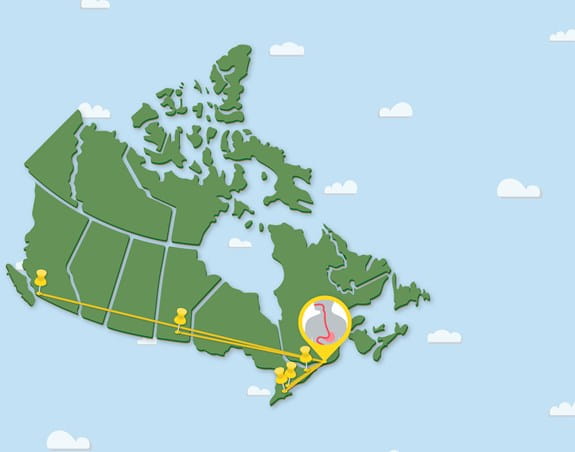
Tailoring treatments for people with esophageal cancer
A team led by Dr Lorenzo Ferri aims to understand what causes treatment resistance in esophageal cancer and identify new methods and treatment options for overcoming this resistance, ultimately improving outcomes and saving lives.
Esophageal cancers generally have a very poor outcome, with only 16% of people in Canada surviving 5 years after their diagnosis. Treatment resistance and a one-size-fits-all approach to treatment are 2 of the main challenges that must be addressed in order to improve survival.
With funding from the Canadian Cancer Society and the Canadian Institutes of Health Research, this multidisciplinary research team will use samples and data from people with esophageal cancer across Canada to tackle treatment resistance head-on. The group has members in Canada and the United States, including researchers from Harvard and Stanford as well as 3 patient partners.
Working with 6 high-volume treatment centres in Canada, the team plans to gather and analyze tumours from 300 patients over the course of their chemotherapy treatment. From these samples, they will grow small organs, called organoids, creating a globally unique resource to help researchers better understand the complexities of treatment resistance. Based on the findings, the organoids, along with 2 other research model systems, will be utilized to screen existing approved drugs, alone and in combination with chemotherapy, resulting in unprecedented information about potential treatment options that could be targeted to an individual’s unique tumour.
Findings from this project will form the foundation for future international clinical trials. If successful, it would lead to promising new personalized treatments to improve outcomes for people with esophageal cancer and save lives.
Total Amount Awarded over 5 years: $ 7,486,649
Team Members
- Lorenzo Ferri, The Research Institute of the McGill University Health Centre (RI-MUHC)
- Swneke Bailey, The Research Institute of the McGill University Health Centre (RI-MUHC)
- Jonathan Cools-Lartigue, The Research Institute of the McGill University Health Centre (RI-MUHC)
- Pierre Fiset, McGill University
- Stephen Gowing, University of Manitoba
- Wael Hanna, McMaster University
- Sidong Huang, McGill University
- Sui Huang, Institute for Systems Biology
- Donald Ingber, Harvard University
- Joseph Kinsella, McGill University
- Anna McGuire, University of British Columbia
- Garry Nolan, Stanford University
- Morag Park, McGill University
- Ioannis Ragoussis, McGill University
- Veena Sangwan, McGill University
- Andrew Seely, University of Ottawa
- Jonathan Yeung, University Health Network
- Jan Almanzor
- John Sauter
- Teresa Tiano
- Nicholas Bertos, Research Institute of the MUHC
- Vineet Bafna, UC San Diego
- Paul Mischel, Stanford University
- Xiaoyang Zhang, University of Utah
Team Geography

